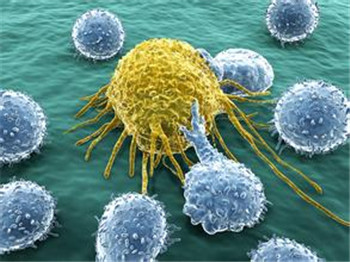(单词翻译:单击)

When I was doing my medical training nearly 20 years ago, there were two kinds of residents: those who were planning on specializing in oncology and those who couldn’t tolerate the subject for even a month. One night when I was on call, I worked with someone in the second camp. He told me about a patient of his, an elderly woman with pancreatic cancer that had grown into her bile duct and metastasized through her intestinal tract. She had been through several rounds of chemotherapy without success and was ready to quit treatment, but was afraid to tell her oncologist. “She told me, ‘I don’t want him to think I’m giving up,’” my colleague said, obviously disgusted that she didn’t feel comfortable speaking freely about her goals.
近20年前,我还在接受医学培训,那时有两种不同类型的住院医生:一种人立志献身于肿瘤学,而另一种人却连专注这个专业哪怕一个月的时间也无法忍受。有一天晚上正值我当班,我和另一个人一起工作。他给我讲了他的一名患者的故事:那是个患有胰腺癌的老年妇女,癌症已经扩散到了胆管,并经由肠道转移了。她接受过数轮化疗都没有成功。她打算放弃治疗,却不敢对她的肿瘤医师明言。“她跟我说:‘我不想让他觉得我放弃了,’ ”我的同事说,语气中很明显地透露出他对她不能自在地抒发心愿而感到不快。
He encouraged her to choose hospice care. Two weeks later, he said to me, his patient’s hospice aide came up to him on the ward. “She told me that my patient made her promise that the day she died, she would come find me and tell me. She said my patient wanted to thank me for encouraging her to die the way she wanted to.”
他鼓励她选择临终关怀,两周后,她的临终关怀助理来到他负责的病房。“她(那助理)告诉我,她是应那患者的要求而来:她答应会在她死去的那天来找我,并给我带话。她说,我的患者很感激我对她的鼓励,这才让她得以按照自己希望的方式死去。”
I thought of this story at various points while reading “The Death of Cancer,” Vincent DeVita Jr.’s fascinating if hubristically titled new book, co-authored with his daughter, Elizabeth DeVita-Raeburn, a science writer. Today, more than four after President Nixon declared war on cancer and with so many new weapons in our arsenal supported by big budgets and a decidedly aggressive posture, when is it O.K. to give up? When is it best ?
我在读小文森特·德维塔(Vincent DeVita Jr)和女儿——科普作家伊丽莎白·德维塔-雷伯恩(Elizabeth DeVita-Raeburn)合著、书名狂妄的趣作《癌症之死》(The Death of Cancer)的过程中,这个故事不时地在我脑海中浮现。今天,距离尼克松总统向癌症宣战已有四十多年,秉持果断进取的姿态,借助雄厚资金的支持,我们已经拥有了很多对抗癌症的“新武器”, 那么,到什么地步放弃治疗才不会感到遗憾?何时才是宣布投降的最佳时机?
DeVita himself has been one of the top commanders in this war. He was in the vanguard of chemotherapists, engineering the first cure for Hodgkin’s disease and diffuse large B-cell lymphoma. Later, he was director of the National Cancer Institute, physician in chief at Memorial Sloan Kettering Cancer Center in Manhattan and president of the American Cancer Society.
德维塔本人一直是抗癌战争的最高指挥官之一。他是资深的化疗专家,参与创建了第一个可治愈霍奇金淋巴瘤和弥漫性大B细胞淋巴瘤的疗法。后来,他担任了美国国家癌症研究所(National Cancer Institute)的主任,曼哈顿纪念斯隆-凯特琳癌症中心(Memorial Sloan Kettering Cancer Center)的主任医师,以及美国癌症协会(American Cancer Society)的主席。
In DeVita’s telling, we are winning this war. Childhood leukemias are now almost completely curable. Death rates for almost all types of cancers are steadily decreasing. We have an array of new biological molecules and immunotherapies that put the old slash-and-burn cancer drugs to shame. When he says, “We have the tools to eradicate cancer,” he is someone we should listen to.
按照德维塔的话来说,我们正在赢得这场战争。小儿白血病现在基本上已经可以完全治愈。几乎所有类型的癌症的死亡率都在稳步下降。我们如今拥有众多足以令旧的“刀耕火种”型癌症药物汗颜的新型生物分子和免疫疗法。所以,他说“我们已经掌握了根除癌症的工具”,这话当然有很高的可信度。
At this point many doctors would advocate a purely palliative approach, but not DeVita. Early in his career, he writes, he learned a “profound” lesson: “never to give up on anyone.” He finds another treatment, an experimental vaccine and a monoclonal antibody, but Lee has severe side effects. He is then put into another study, but the experimental treatment fails to achieve remission. By then the cancer has spread to his lungs and bones. He is given another experimental drug but develops severe diarrhea as a side effect. He becomes dehydrated and has to be admitted to the hospital, where an oncologist decides to try another combination of drugs, a decision DeVita calls “courageous.”
到了这个时候,很多医生会建议患者接受姑息疗法,但德维塔并没有这样做。他写道,在他的职业生涯早期,他就已得到了“深刻的”教训:“永远不要轻易放弃任何人。”他又找到了其他的治疗方法:一种实验性疫苗和一种单克隆抗体,但李先生出现了严重的副作用。然后,李先生又参与了一项别的研究,但该实验性治疗也未能缓解其病情。此时,癌细胞已经扩散到了他的肺部和骨骼。他接受了另一种实验性药物,可副作用又来了:他严重腹泻,因为脱水,他只能入院治疗。医院的肿瘤科医生决定再试试另一种药物组合,连德维塔都称这一决定“勇气可嘉”。
Lee’s cancer is kept at bay for almost a year, but it recurs with a vengeance. However, DeVita isn’t done. He tries to get Lee one more experimental drug, abiraterone, but the company that manufactures it and guidelines from the Food and Drug Administration refuse to allow it to be used in patients with prostate cancer that is so far advanced. Without further options, Lee is finally admitted into hospice care and dies two weeks later at home. “It was awful to watch,” DeVita writes. “I kept thinking about the treatments Lee didn’t get.”
李先生的癌症得到了控制,可惜还不到一年,它再度爆发了。德维塔仍不肯就此罢休。他试图让李先生再试用一种新的实验性药物——阿比特龙(abiraterone),但生产该药物的公司和美国食品和药品监督管理局(Food and Drug Administration)的指南都不允许将其用于终末期前列腺癌患者。此时李先生终于别无选择,只得转入临终关怀机构,两周后在家中去世。“目睹这一切真让人难受,”德维塔写道,“我一直对李先生没能获得的治疗念念不忘。”
Despite my uneasiness with DeVita’s take-no-prisoners strategy, I thoroughly enjoyed his book. He gives an authoritative review of the history of surgery and radiation therapy. His depictions of the behind-the-scenes search for new cancer drugs and the turf wars between radiation, surgical and medical oncologists are dishy and fascinating. He tells many poignant anecdotes, like one about a 10-year-old cancer patient who gives DeVita a 50-cent piece because he puts in her intravenous line on the first try. Ultimately, DeVita ably shows that the development of oncology as a modern specialty is a very human story.
尽管德维塔绝不罢休的治疗策略让我不太舒服,但我还是非常喜欢他的这本书。他对手术和放疗的历史做出了权威的回顾,介绍了寻找新型抗癌药物的幕后故事,描写了放疗、外科和内科肿瘤学家间的激烈交锋,读来引人入胜。他讲述了许多令人心痛的往事,譬如一个10岁的癌症患者曾经给他50美分,因为他在给她静脉注射扎针时一次就成功了。总而言之,德维塔精妙的文笔,让你觉得自己并非是在阅读肿瘤学作为一门现代专业的发展历程,而是在聆听一个非常人性化的故事。
But in the end I would have liked to see more about palliative care: when to give up the good fight. In the case of his friend, DeVita writes that a study published two years after Lee died showed that patients with advanced prostate cancer treated with abiraterone were living longer. He calls it a “near miss” — if Lee had lived two more years, he could have been one of those patients. But he doesn’t mention that the abiraterone-treated patients lived only 3.9 months longer than they otherwise would have.
只是归根结底,我还是希望能看到更多关于姑息治疗的内容,譬如,什么时候可以放弃与癌症战斗?以他的朋友为例,德维塔在书中写道,在李先生去世两年后发表的一项研究显示,接受阿比特龙治疗的晚期前列腺癌患者生存期较长。他感叹这“真是缘悭一线”——倘若李先生当初能够挺过两年以上的时间,他本可以成为这些患者中的一员。可是他并没有提到,接受阿比特龙治疗的患者也仅比不治疗多活了3.9个月而已。


